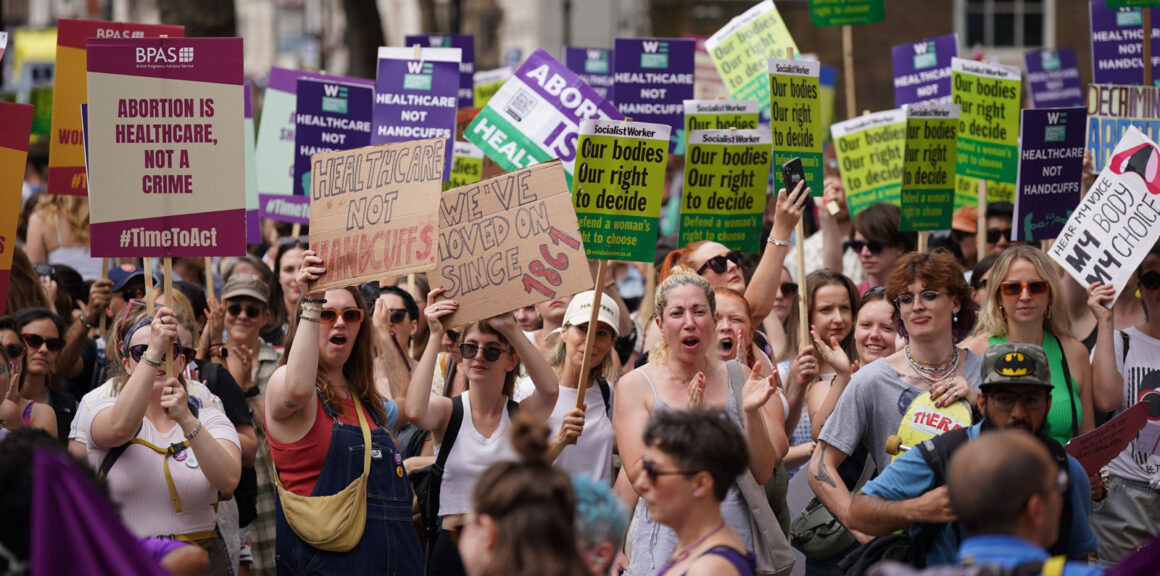

By Agnes Sampson
THERE WAS shock and outrage when, on 12 June, Carla Foster was sentenced in Stoke-on-Trent to 28 months in prison for giving herself a late abortion in 2020 during the Covid lockdown. The foetus was 32–34 weeks in development, while the arbitrary time limit for legal abortions is set at 23 weeks and 6 days.
Most people wrongly assumed that abortion had been decriminalised, but Justice Edward Pepperall dug up a law from 1861 to find her guilty. Section 58 of the Offences against the Person Act states:
‘Every Woman, being with Child, who, with Intent to procure her own Miscarriage . . . shall be guilty of Felony, and being convicted thereof shall be liable, at the Discretion of the Court, to be kept in Penal Servitude for Life or . . . imprisoned for any Term not exceeding Two Years, with or without Hard Labour, and with or without Solitary Confinement.’
Foster pleaded not guilty to this charge and the Judge later said that, had she pleaded guilty, he would not have sentenced her to a prison term. Carla has three children, one with learning disabilities, and they too are being cruelly punished by this misogynistic Victorian legislation.
Ironically, in Northern Ireland, with traditionally less liberal laws than the rest of the UK, this 1861 legislation was repealed when Stella Creasy MP proposed a successful amendment in 2019 to scrap the Act. Now she is campaigning to remove it from the statutes in England.
£1 billion cuts
This case highlights the barriers many thousands of women face trying to get appropriate and timely treatments. A recent article in the British Medical Journal pointed to £1 billion Tory cuts to reproductive healthcare since 2015. It concluded:
‘Growing demand for sexual health consultations coupled with cuts in funding has left services in England at ‘breaking point’ . . . the total number of sexual health consultations in 2021 stood at 4,002,827 — up by 16 percent from 2020 and by 36 percent since 2013. At the same time cuts in funding have led to a 17 percent reduction in spending on sexually transmitted infection (STI) testing, contraception, and treatment over the past seven years.’
Judge Pepperall, however, showed his utter disdain for the health profession when he further criticised medical experts for writing to him urging him not to imprison Foster, but to treat her with compassion and understanding. These included the president of the Royal College of Obstetricians and Gynaecologists, the chief executive of the Royal College of Midwives, the president of the Faculty of Sexual & Reproductive Healthcare, the president of the Faculty of Public Health, and the chair of the Royal College of Obstetricians and Gynaecologists’ Abortion Taskforce.
Pepperall accused these experts of making things worse and said if he had received a letter from pro-life advocates he would also have dismissed it too — giving equal weight to the views of medical experts and pro-life anti-abortionists, many of whom do not base their views on medical evidence but on religious ideology.
Choices?
Cuts in health services mean that contraceptive advice and access to safe and free abortion is not available to all within the time limit, though most abortions do take place fairly early.
But there are other social issues that make unplanned and possibly unwanted pregnancies inevitable: inadequate, cramped or unaffordable accommodation, an abusive or controlling partner, lack of income (Child Poverty Action estimates that 1.1million children are growing up in poverty). Add to this the cost of childcare, typically costing up to £820 per month for two days a week in London), lack of help from medical and social services for children with special needs or disabilities, etc.
Indeed women’s capacity to conceive and give birth has often been manipulated for economic and political reasons. For example, after World War 1, some European countries — France, Germany and Italy under fascism, and the USSR under Stalin — encouraged women to have more children to replace the war dead.
At the other extreme, during China’s one-child policy, between 1980 and 2016, women were forcibly sterilised and underwent compulsory abortions. Families’ preference for male children meant many baby girls were aborted, killed or abandoned.
In the USA, it is conservatively estimated that 60,000 women of colour and poor whites were forcibly sterilised, many without their knowledge, between 1909 and the 1970s. This was based on racist eugenics and white supremacists’ fear of the ‘great displacement’.
There are many countries in the world where abortions are very difficult to access and, as the Supreme Court ruling in the States overturning Roe vs Wade shows, it is getting worse. Abortion is totally illegal in Palestine, Malta, Senegal, Iraq, El Salvador, Nicaragua and Jamaica.
Labour MP Stella Creasy’s call to decriminalise abortion is important but much more is needed. All who support women’s equality, whether they are in campaign groups, the labour movement or political organisations, must fight for a woman’s right to choose whether and when to terminate her pregnancy, as soon as possible, as late as necessary.
We demand